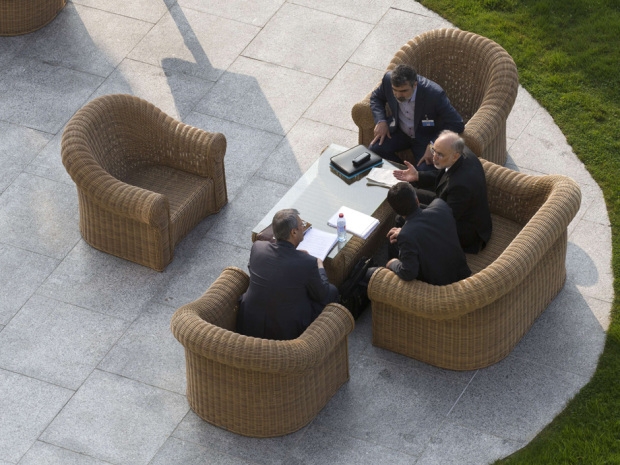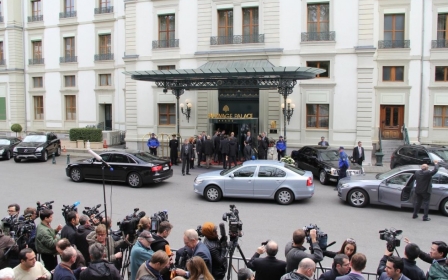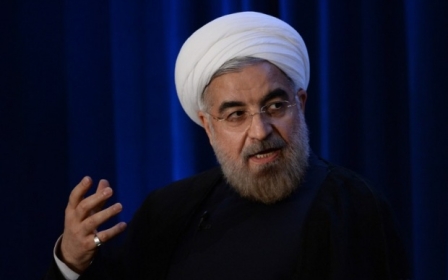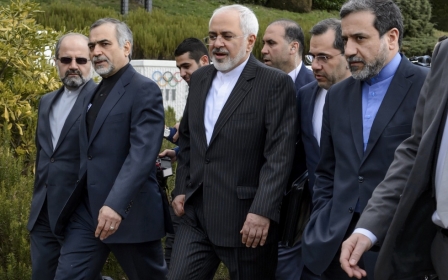Tentative deal reached in Iran nuclear talks as Netanyahu warns of 'dangerous' accord
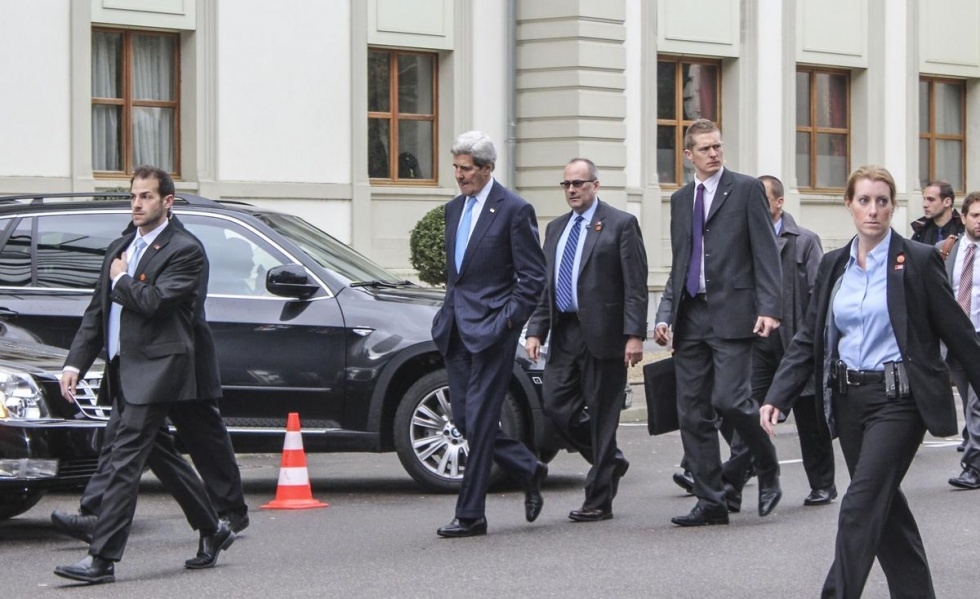
Iran and six world powers have reached a tentative agreement on key parts of a deal sharply curtailing Tehran's nuclear programme, Western diplomats said on Sunday while cautioning that the pact is by no means done.
One of these diplomats in talks in Switzerland said Iran had "more or less" agreed to slash the number of its centrifuge machines by more than two-thirds and to ship abroad most of its stockpile of nuclear material.
US Secretary of State John Kerry, who is leading negotiations for Washington, cancelled a trip to Boston to attend a memorial ceremony for the late senator Edward Kennedy to stay at the final days of the talks.
The French and German Foreign Ministers also rearranged their schedules to remain at the negotiations, which have until midnight on Tuesday to reach a deal.
As negotiators in Lausanne raced to nail down the outline of a deal, due to be finalised by 30 June, the diplomats cautioned that with some tough issues still to resolve, things could yet change.
Iranian diplomats denied that any tentative agreement on these points had been struck, saying that reports of a deal on a specific number of centrifuges and exporting its stockpiles were "journalistic speculation".
"The fact is that we will conserve a substantial number of centrifuges, that no site will be closed, in particular Fordo. These are the basis of the talks," the Iranian diplomat said.
Iranian Foreign Minister Javad Zarif said on Saturday night that it was time for the US and its allies to choose whether to pursue “pressure or agreement”.
A senior member of the Iranian negotiating team said that the "publication of such information by certain Western media is aimed at creating an atmosphere to disturb the negotiating process".
Iranian negotiators are keen to avoid having a formal accord publicised, and there are disagreements over which parts of any potential deal would be made public.
Zarif has warned that a published deal could be a “paper tiger” for the deal’s opponents – “anybody can kill it”.
Under the outlines coming together to deny Iran the capacity to develop a nuclear bomb, the underground Fordo facility near the holy city of Qom would cease uranium enrichment, another diplomat told AFP, hinting that it would likely stay open for other purposes.
But diplomats stressed that all aspects of the deal are inter-related, and that there were still unresolved issues such as Iran’s nuclear research and development programme, which Western nations fear could mask a cover path to seeking nuclear weapons. Iran has always denied seeking to develop the bomb since a fatwah against nuclear weapons issued by late supreme leader Ayatollah Ruhollah Khomeni.
Another hurdle is a network of US, EU and UN sanctions imposed on Tehran over the years for its nuclear activities and for violating the nuclear Non-Proliferation Treaty.
Iran has called for the sanctions to be completely lifted. But a senior US official said there was general agreement about a phased approach between all parties, with different elements seen as having different timelines and durations.
It remained unclear however whether agreement on the broad contours of a deal could be reached by a Tuesday midnight deadline, the official said.
Centrifuges render uranium suitable for nuclear power generation but at high purities also for the core of a nuclear bomb. Iran's stockpiles of enriched uranium could in theory be further processed to this level.
If a deal is achieved, it is likely to be announced in the Swiss city of Geneva, rather than the lakeside town of Lausanne.
Netanyahu attacks ‘dangerous’ deal
As US and Iranian diplomats expressed tentative optimism ahead of the 31 March deadline for the talks, Israeli Prime Minister Benjamin Netanyahu went on the offensive, warning that any agreement will be “even worse” than he had feared.
"The dangerous accord which is being negotiated in Lausanne (Switzerland) confirms our concerns and even worse," Netanyahu said in remarks at a meeting of his cabinet broadcast on public radio.
Netanyahu denounced the "Iran-Lausanne-Yemen axis which is dangerous for all of humanity and which must be stopped," making a reference to the Swiss city where the talks are taking place.
The premier warned that Iran could be in a position to "conquer" the Middle East through what he called the "axis" of control it has over the capitals of Iraq, Lebanon and Syria.
Netanyahu’s remarks came as Israeli officials indicated a possible shift in their attitude to the negotiations, which the country has staunchly opposed throughout.
Officials told BuzzFeed correspondent Sheera Frenkel that they are now hoping to “influence [the] finer points” of any future deal rather than try to scupper the negotiations at the last minute.
In his address on Sunday, Netanyahu also said that his country had "strong, bipartisan support" from both Republican and Democratic lawmakers in the United States.
Netanyahu angered the White House when he addressed a joint session of the Congress to warn against a nuclear deal with Iran in the lead-up to Israel's 17 March general election.
'Very serious doubts'
The comments came as Gilad Erdan, a member of Netanyahu's Likud party, said the US "Congress could be the last obstacle to lifting of the sanctions against Iran" once any accord is struck.
"An in-principle agreement is likely to be concluded in two days, but the signing of a final agreement is expected at the end of June, so there will be enough time for diplomacy," Erdan told army radio.
Intelligence Minister Yuval Steinitz also criticised the possible conclusion of a "bad deal full of loopholes", adding that Israel was not alone.
"Very serious doubts also exist in the United States, Europe, France and Britain," Steinitz, a close ally of the prime minister, said on public radio.
But Nachman Shai, a lawmaker from the opposition Labor party, criticised Netanyahu's approach.
"We suffered a defeat in this case and the result is bad for Israel, which has failed to curb Iran's nuclear programme," Shai told public radio.
"We should have acted behind the scenes and left it to the great powers, and thus avoided making the Iranian nuclear programme a dispute between Israel and Iran," he added.
President Reuven Rivlin on Wednesday formally tasked Netanyahu with forming the next government after his rightwing Likud party scored a surprise election victory.
New MEE newsletter: Jerusalem Dispatch
Sign up to get the latest insights and analysis on Israel-Palestine, alongside Turkey Unpacked and other MEE newsletters
Middle East Eye delivers independent and unrivalled coverage and analysis of the Middle East, North Africa and beyond. To learn more about republishing this content and the associated fees, please fill out this form. More about MEE can be found here.


